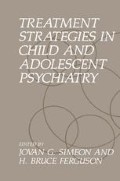Abstract
Proposals that food affects children’s behaviors have surfaced sporadically in the clinical and research literature for over 50 years (Randolph, 1947; Rowe, 1931). In spite of this long-standing hypothetical association between food and behavior, it is only since 1970 that there has been widespread public and professional interest in altering diet as a therapeutic approach in dealing with disturbing behaviors and learning problems of children. Each food-behavior hypothesis developed a fervent public following in advance of appropriate controlled research testing. Indeed, much of the eventual experimental study of such hypotheses was in response to the widespread public acceptance of anecdotal reports of the effects of food on behavior. Also, in most cases, the food-related hypothesis was proposed as a general cause of behavior problems. Thus, the idea was not just that specific food substances could cause problem behaviors in children but that, in fact, they caused problem behaviors in large numbers of children.
Access this chapter
Tax calculation will be finalised at checkout
Purchases are for personal use only
Preview
Unable to display preview. Download preview PDF.
References
Bock, S. A. (1987). A critical evaluation of clinical trials in adverse reactions to foods in children. Journal of Allergy and Clinical Immunology, 78:165–174.
Conners, C. K. (1980). Food additives and hyperactive children. New York: Plenum Press.
Conners, C. K., Caldwell, J., Caldwell, L., Schwab, E., Kronsberg, S., Wells, K. C., Leong, N., & Blouin, A. G. (1985, February). Experimental studies of sugar and aspartame on autonomic, cortical and behavioral responses of children. Paper presented at a symposium, Diet and behavior: A multidisciplinary approach, sponsored by the American Medical Association and the International Life Sciences Institute, Arlington, Va.
Conners, C. K., Goyette, C. H., Southwick, D. A., Lees, J. M., & Andrulonis, P. A. (1976). Food additives and hyperkinesis: A controlled double-blind experiment. Pediatrics, 58, 154–166.
Crook, W. G., Harrison, W. W., Crawford, S. E., & Emerson, B. S. (1961). Systemic manifestations due to allergy. Report of fifty patients and a review of the literature on the subject. Pediatrics, 27, 790–799.
Eggar, J., Carter, C. M., Graham, P.J., Gumley, D., & Soothill, J. (1985). Controlled trial of oligoantigenic treatment of the hyperkinetic syndrome. Lancet, 1, (8428), 540–545.
Feingold, B. F. (1975). Why is your child hyperactive? New York: Random House.
Ferguson, H. B., Rapoport, J. L., & Weingartner, H. (1981). Technical comment: Food dyes impair performance of hyperactive children. Science, 211, 410.
Ferguson, H. B., Stoddart, C., & Simeon, J. G. (1986). Double-blind challenge studies of behavioral and cognitive effects of sucrose-aspartame ingestion in normal children. Nutrition Reviews (Suppl.) 44:144–150.
Fernstrom, J. D., & Wurtman, R. J. (1972). Brain serotonin content: Physiological regulation by plasma neutral amino acids. Science, 178, 414.
Fernstrom, J. D., & Wurtman, R. J. (1974). Nutrition and the brain. Scientific American, 230, 84.
Goldman, A. S., Anderson, D. W., Sellers, W. A., Saperstein, S., Kniken, W. T., Holpern, S. R., et al. (1963). Milk allergy: 1. Oral challenges with milk and isolated milk proteins in allergic children. Pediatrics, 9, 425–443.
Harley, J. P., Ray, R. S., Tomasi, L., Eichman, P. L., Mathews, C. G., Chun, R., Cleeland, C. S., & Traisman, E. (1978). Hyperkinesis and food additives: Testing and Feingold hypothesis. Pediatrics, 61, 818–828.
Kaplan, B. J. (1988). The relevance of food for children’s cognitive and behavioral health. Canadian Journal of Behavioral Science, 20(4), 359–373.
Kaplan, B. J., McNicol, J., Conte, R. A., & Moghadam, H. K. (1989). Dietary replacement in preschool-aged hyperactive boys. Pediatrics, 83(1), 7–17.
Langseth, L., & Dowd, J. (1978). Glucose tolerance and hyperkinesis. Food and Cosmetics Toxicology, 16, 129–133.
Milich, R., Wolraich, M., & Lindgren, S. (1986). Sugar and hyperactivity: A critical review of empirical findings. Clinical Psychology Review, 6, 493–513.
Prinz, R. J., Roberts, W. A., & Hartman, E. (1980). Dietary correlates of hyperactivity in children. Journal of Consulting and Clinical Psychology, 48, 760–770.
Randolph, T. G. (1947). Allergy, a cause of fatigue, irritability and behavior problems in children. Journal of Pediatrics, 31, 560.
Rapoport, J. L., Berg, C. J., Ismond, D. R., Zahn, T. P., & Neims, A. (1984). Behavioral effects of caffeine in children. Archives of General Psychiatry, 41, 1073–1079.
Rowe, A. H. (1931). Food allergy: Its manifestations, diagnosis and treatment. Philadelphia: Lea and Febiger.
Simeon, J. G., Ferguson, H. B., Ralph, C., & Mistry, P. (1982). Parental reports of adverse responses to food substances in child psychiatry patients and controls. Psychopharmacology Bulletin, 18(4), 206–209.
Spring, B., Chiodo, J., & Bowen, D. J. (1987). Carbohydrates, tryptophan, and behavior: A methodological review. Psychological Bulletin, 2, 234–256.
Swanson, J. M., & Kinsbourne, M. (1980). Food dyes impair performance of hyperactive children on a laboratory learning test. Science, 207, 1485–1487.
Trites, R. L., Blouin, A. G. A., Ferguson, H. B., & Lynch, G. (1975). The Conners Teacher Rating Scale: An epidemiologic, inter-rater reliability and follow-up investigation. In K. D. Gadow & J. Loney (Eds.), Psychosocial aspects of drug treatment for hyperactivity (pp. 157-175). Washington, DC: American Academy for the Advancement of Sciences.
Trites, R. L., Tryphonas, H., & Ferguson, H. B. (1980). Diet treatment of hyperactivity in a child with food allergies. In R. M. Knights and D. Bakker (Eds.), The rehabilitation, treatment, and management of learning disabilities. Baltimore: University Park Press.
Weiss, B., Williams, J. H., Margen, S., Abrams, B., Caan, B., Citron, L. J., Cox, C., McKibben, J., Ogar, D., & Schultz, S. (1980). Behavioral responses to artificial food colors. Science, 207, 1487–1488.
Wolraich, M. L., Stumbo, P., Milich, R., Chenard, C., & Schultz, F. (1988). Dietary characteristics of hyperactive and control boys and their behavioral correlates. Journal of the American Dietetic Association, 4, 500–504.
Author information
Authors and Affiliations
Rights and permissions
Copyright information
© 1990 Springer Science+Business Media New York
About this chapter
Cite this chapter
Ferguson, H.B. (1990). Recent Developments in Diet Therapy. In: Treatment Strategies in Child and Adolescent Psychiatry. Springer, Boston, MA. https://doi.org/10.1007/978-1-4899-2599-2_9
Download citation
DOI: https://doi.org/10.1007/978-1-4899-2599-2_9
Publisher Name: Springer, Boston, MA
Print ISBN: 978-1-4899-2601-2
Online ISBN: 978-1-4899-2599-2
eBook Packages: Springer Book Archive

